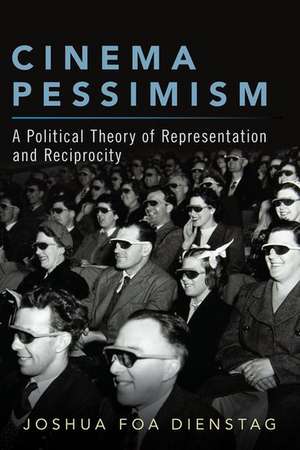Cinema Pessimism: A Political Theory of Representation and Reciprocity
Autor Joshua Foa Dienstagen Limba Engleză Paperback – 7 ian 2020
| Toate formatele și edițiile | Preț | Express |
|---|---|---|
| Paperback (1) | 195.98 lei 11-16 zile | |
| Oxford University Press – 7 ian 2020 | 195.98 lei 11-16 zile | |
| Hardback (1) | 583.47 lei 32-37 zile | |
| Oxford University Press – 7 ian 2020 | 583.47 lei 32-37 zile |
Preț: 195.98 lei
Preț vechi: 217.32 lei
-10% Nou
Puncte Express: 294
Preț estimativ în valută:
37.50€ • 40.10$ • 31.27£
37.50€ • 40.10$ • 31.27£
Carte disponibilă
Livrare economică 17-22 martie
Preluare comenzi: 021 569.72.76
Specificații
ISBN-13: 9780190067724
ISBN-10: 0190067721
Pagini: 192
Dimensiuni: 206 x 137 x 10 mm
Greutate: 0.25 kg
Editura: Oxford University Press
Colecția OUP USA
Locul publicării:New York, United States
ISBN-10: 0190067721
Pagini: 192
Dimensiuni: 206 x 137 x 10 mm
Greutate: 0.25 kg
Editura: Oxford University Press
Colecția OUP USA
Locul publicării:New York, United States
Recenzii
In Cinema Pessimism, Dienstag challenges what he sees as the tendency of contemporary political and film theory to equate representation and freedom. He holds that while visual culture and contemporary politics have stretched the limits of visibility, representation does not automatically enhance human autonomy.
Dienstag's book, by focusing on film, offers an intriguing approach to this problem ... there is enough heft to each individual part of the book to justify its inclusion in the ranks of valuable studies of the challenges and dangers of political representation.
How can the movies instruct us in the forms and feelings of democratic representation? How does political theory explain our attachments to cinematic realism and our investments in characters that resemble us? Exploring these questions, Cinematic Pessimism mounts a critique of our 'representative condition,' namely the collective desire that the movies and our elected leaders reflect us in near every detail. From his inventive reading of such films as Blade Runner, Her, The Man Who Shot Liberty Valance, and Up we learn that perfect representation may inhibit our freedom, happiness, and capacity for mutual regard. Cinema dramatizes this dilemma and, in Dienstag's reading, helps us to think beyond it. Anyone wanting to understand the aesthetic allure of democratic representation needs to read this compelling book.
Cinema Pessimism vividly demonstrates the importance of film to democratic theory's ongoing reassessment of political representation. Through brilliant engagements with such films as Blade Runner, Her, and The Man Who Shot Liberty Valence, Dienstag reveals the limitations of prevailing theoretical models and develops his own distinctively "pessimist" argument about political representation's fraught role as bothan enabler and an obstacle to democratic freedom. This book makes a decisive contribution to the political theory of film.
Studies of the political significance of film often worry that political life is threatened by the widespread passion for movies, in much the way that it is supposedly threatened by comics, rock'n'roll, rap, or the 'boob tube.' Dienstag's worry is deeper. In five lucid and provocative readings of films such as Her and Europa, he explores the prospect that filmic representation of the world itself reveals the possibilities and especially the dangers of the seemingly quite different representation of people and interests in contemporary politics. The result might be described as an updating of Rousseau's critique of the theater for our time.
Dienstag's book, by focusing on film, offers an intriguing approach to this problem ... there is enough heft to each individual part of the book to justify its inclusion in the ranks of valuable studies of the challenges and dangers of political representation.
How can the movies instruct us in the forms and feelings of democratic representation? How does political theory explain our attachments to cinematic realism and our investments in characters that resemble us? Exploring these questions, Cinematic Pessimism mounts a critique of our 'representative condition,' namely the collective desire that the movies and our elected leaders reflect us in near every detail. From his inventive reading of such films as Blade Runner, Her, The Man Who Shot Liberty Valance, and Up we learn that perfect representation may inhibit our freedom, happiness, and capacity for mutual regard. Cinema dramatizes this dilemma and, in Dienstag's reading, helps us to think beyond it. Anyone wanting to understand the aesthetic allure of democratic representation needs to read this compelling book.
Cinema Pessimism vividly demonstrates the importance of film to democratic theory's ongoing reassessment of political representation. Through brilliant engagements with such films as Blade Runner, Her, and The Man Who Shot Liberty Valence, Dienstag reveals the limitations of prevailing theoretical models and develops his own distinctively "pessimist" argument about political representation's fraught role as bothan enabler and an obstacle to democratic freedom. This book makes a decisive contribution to the political theory of film.
Studies of the political significance of film often worry that political life is threatened by the widespread passion for movies, in much the way that it is supposedly threatened by comics, rock'n'roll, rap, or the 'boob tube.' Dienstag's worry is deeper. In five lucid and provocative readings of films such as Her and Europa, he explores the prospect that filmic representation of the world itself reveals the possibilities and especially the dangers of the seemingly quite different representation of people and interests in contemporary politics. The result might be described as an updating of Rousseau's critique of the theater for our time.
Notă biografică
Joshua Foa Dienstag is Professor of Political Science and Law at the University of California, Los Angeles. He is the author of three previous books including, Pessimism: Philosophy, Ethic, Spirit, which won the Book Award for Excellence in Philosophy from the American Association of Publishers, and most recently, Cinema, Democracy, Perfectionism.
